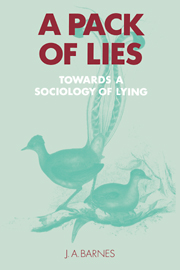Book contents
- Frontmatter
- Contents
- Preface
- Acknowledgments
- 1 What is a lie?
- 2 Where lies are expected
- 3 Ambiguous domains
- 4 Science
- 5 Cultural diversity
- 6 Relations
- 7 Self-deception and connivance in deceit
- 8 Telling and detecting lies
- 9 Benign untruths: the discourse of fiction
- 10 Evaluations
- 11 Do we have to have lies?
- References
- Index
1 - What is a lie?
Published online by Cambridge University Press: 29 August 2009
- Frontmatter
- Contents
- Preface
- Acknowledgments
- 1 What is a lie?
- 2 Where lies are expected
- 3 Ambiguous domains
- 4 Science
- 5 Cultural diversity
- 6 Relations
- 7 Self-deception and connivance in deceit
- 8 Telling and detecting lies
- 9 Benign untruths: the discourse of fiction
- 10 Evaluations
- 11 Do we have to have lies?
- References
- Index
Summary
INTRODUCTION
Lies are everywhere. We hear continually about lying in public and private life. Very few people would claim never to have told a lie, and even fewer would say they have never been duped by a liar. Writing in a magazine in January 1889 Oscar Wilde (1989:216) complained that, with the possible exception of the speeches of barristers, lying as an art had decayed. A hundred years later, most people would say that there is now more lying than there used to be; a British journalist (Lott 1990) has labelled the 1980s as ‘the decade of lies’. In 1991, an American journalist (Bradlee 1991) commented that ‘It seems to me that lying has reached epidemic proportions in recent years and that we've all become immunized to it.’
Whether lies are in fact told more often nowadays than previously is anyone's guess, but at least there is a greater awareness of the prevalence of lying, partly because public lying is now often exposed more promptly. As Rasberry (1981:2–3) says:
History has recorded numerous situations where political leaders have lied, but most of these lies were not revealed for years. Because of media improvements in the last 25 years, citizens today see and hear deception as it occurs.
We see lying as a regrettable human failing and assume that unless we make great efforts to train children to be honest, they will follow a natural tendency and tell lies.
- Type
- Chapter
- Information
- A Pack of LiesTowards a Sociology of Lying, pp. 1 - 19Publisher: Cambridge University PressPrint publication year: 1994



